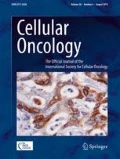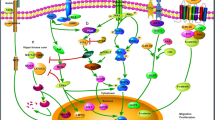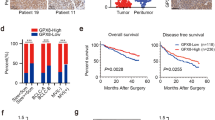Abstract
Purpose
Cholangiocarcinoma (CCA) is an aggressive type of cancer. The major obstacles for treatment are its late presentation and the occurrence metastases. Targeting the metastatic process may serve as a treatment option. CD147 is a membrane protein that promotes CCA metastasis. High lactate levels in CCA are predicted to result from lactate dehydrogenase A expression and sensitivity to monocarboxylate transporter (MCT) inhibitors. An involvement of CD147 in MCT maturation has been reported, but the exact role of MCT in CCA is not clear. Here, we aimed to assess the mechanism of CD147-promoted CCA progression through MCT regulation.
Methods
The expression levels of CD147 and MCT-1/4 in human CCA tissues were determined by immunohistochemistry. Two CD147 knockout (CD147 KO) CCA cell (KKU-213) clones were established using the CRISPR/Cas9 system. Cell migration and invasion were determined using a Boyden chamber assay. Temporal protein levels were modified by siRNA, specific inhibitors and/or activators. The expression of target proteins was determined using Western blot analyses.
Results
CD147 and MCT-1/4 were found to be overexpressed in CCA tissues compared to normal bile duct tissues. In addition, we found that CD147 knockdown significantly alleviated CCA cell migration and invasion, concomitant with decreased pAkt, pFoxO3, pNF-κB (pp65) and MCT-1/4 levels. Conversely, we found that FoxO3 knockdown led to recovered migration/invasion abilities and increased pp65 and MCT-1/4 expression levels. The involvement of Akt in the regulation of MCT-1/4 expression through CD147 was established by inhibition and activation of Akt phosphorylation.
Conclusion
Our data indicate that CD147 promotes the malignant progression of CCA cells by activating the Akt-FoxO3-NF-κB-MCT-1/4 axis. As such, CD147 may serve as a possible target for advanced CCA treatment.





Similar content being viewed by others
Abbreviations
- Akt:
-
Protein kinase B (PKB)
- CCA:
-
Cholangiocarcinoma
- CRISPR/Cas9:
-
Clustered regularly interspaced short palindromic repeats/CRISPR-associated protein 9
- DMEM:
-
Dulbecco’s modified Eagle’s medium
- DHMEQ:
-
Dehydroxymethylepoxyquinomicin
- EMT:
-
Epithelial-mesenchymal transition
- Fox:
-
Forkhead protein
- IHC:
-
Immunohistochemistry
- CD147 KO:
-
CD147 knockout
- HRP:
-
Horseradish peroxidase
- MCT:
-
Monocarboxylate transporter
References
B. Sripa, C. Pairojkul, Cholangiocarcinoma: Lessons from Thailand. Curr Opin Gastroenterol 24, 349–356 (2008)
N.F. Esnaola, J.E. Meyer, A. Karachristos, J.L. Maranki, E.R. Camp, C.S. Denlinger, Evaluation and management of intrahepatic and extrahepatic cholangiocarcinoma. Cancer 122, 1349–1369 (2016)
S.A. Khan, B.R. Davidson, R.D. Goldin, N. Heaton, J. Karani, S.P. Pereira, W.M. Rosenberg, P. Tait, S.D. Taylor-Robinson, A.V. Thillainayagam, H.C. Thomas, H. Wasan, G. British, Society of, guidelines for the diagnosis and treatment of cholangiocarcinoma: An update. Gut 61(1657-1669) (2012)
O. Warburg, Iron, the oxygen-carrier of respiration-ferment. Science 61, 575–582 (1925)
G. van Niekerk, A.M. Engelbrecht, Role of PKM2 in directing the metabolic fate of glucose in cancer: A potential therapeutic target. Cell Oncol 41, 343–351 (2018)
C. Pinheiro, A. Longatto-Filho, J. Azevedo-Silva, M. Casal, F.C. Schmitt, F. Baltazar, Role of monocarboxylate transporters in human cancers: State of the art. J Bioenerg Biomembr 44, 127–139 (2012)
P. Kirk, M.C. Wilson, C. Heddle, M.H. Brown, A.N. Barclay, A.P. Halestrap, CD147 is tightly associated with lactate transporters MCT1 and MCT4 and facilitates their cell surface expression. EMBO J 19, 3896–3904 (2000)
P. Fisel, E. Schaeffeler, M. Schwab, Clinical and functional relevance of the monocarboxylate transporter family in disease pathophysiology and drug therapy. Clin Transl Sci 11, 352-364 (2018)
W. Schneiderhan, M. Scheler, K.H. Holzmann, M. Marx, J.E. Gschwend, M. Bucholz, T.M. Gress, T. Seufferlein, G. Adler, F. Oswald, CD147 silencing inhibits lactate transport and reduces malignant potential of pancreatic cancer cells in in vivo and in vitro models. Gut 58, 1391–1398 (2009)
J. Hao, H. Chen, M.C. Madigan, P.J. Cozzi, J. Beretov, W. Xiao, W.J. Delprado, P.J. Russell, Y. Li, Co-expression of CD147 (EMMPRIN), CD44v3-10, MDR1 and monocarboxylate transporters is associated with prostate cancer drug resistance and progression. Br J Cancer 103, 1008–1018 (2010)
C. Biswas, Tumor cell stimulation of collagenase production by fibroblasts. Biochem Biophys Res Commun 109, 1026–1034 (1982)
Z.D. Han, X.C. Bi, W.J. Qin, H.C. He, Q.S. Dai, J. Zou, Y.K. Ye, Y.X. Liang, G.H. Zeng, Z.N. Chen, W.D. Zhong, CD147 expression indicates unfavourable prognosis in prostate cancer. Pathol Oncol Res 15, 369–374 (2009)
S. Zhu, D. Chu, Y. Zhang, X. Wang, L. Gong, X. Han, L. Yao, M. Lan, Y. Li, W. Zhang, EMMPRIN/CD147 expression is associated with disease-free survival of patients with colorectal cancer. Med Oncol 30, 369 (2013)
K.D. Curtin, I.A. Meinertzhagen, R.J. Wyman, Basigin (EMMPRIN/CD147) interacts with integrin to affect cellular architecture. J Cell Sci 118, 2649–2660 (2005)
P. Zhao, W. Zhang, S.J. Wang, X.L. Yu, J. Tang, W. Huang, Y. Li, H.Y. Cui, Y.S. Guo, J. Tavernier, S.H. Zhang, J.L. Jiang, Z.N. Chen, HAb18G/CD147 promotes cell motility by regulating annexin II-activated RhoA and Rac1 signaling pathways in hepatocellular carcinoma cells. Hepatology 54, 2012–2024 (2011)
C. Biswas, Y. Zhang, R. DeCastro, H. Guo, T. Nakamura, H. Kataoka, K. Nabeshima, The human tumor cell-derived collagenase stimulatory factor (renamed EMMPRIN) is a member of the immunoglobulin superfamily. Cancer Res 55, 434–439 (1995)
A.P. Halestrap, M.C. Wilson, The monocarboxylate transporter family--role and regulation. IUBMB Life 64, 109–119 (2012)
P. Huang, S. Chang, X. Jiang, J. Su, C. Dong, X. Liu, Z. Yuan, Z. Zhang, H. Liao, RNA interference targeting CD147 inhibits the proliferation, invasiveness, and metastatic activity of thyroid carcinoma cells by down-regulating glycolysis. Int J Clin Exp Pathol 8, 309–318 (2015)
D.M. Voss, R. Spina, D.L. Carter, K.S. Lim, C.J. Jeffery, E.E. Bar, Disruption of the monocarboxylate transporter-4-basigin interaction inhibits the hypoxic response, proliferation, and tumor progression. Sci Rep 7, 4292 (2017)
P. Dana, R. Kariya, K. Vaeteewoottacharn, K. Sawanyawisuth, W. Seubwai, K. Matsuda, S. Okada, S. Wongkham, Upregulation of CD147 promotes metastasis of cholangiocarcinoma by modulating the epithelial-to-mesenchymal transitional process. Oncol Res 25, 1047–1059 (2017)
U. Thonsri, W. Seubwai, S. Waraasawapati, K. Sawanyawisuth, K. Vaeteewoottacharn, T. Boonmars, U. Cha'on, Overexpression of lactate dehydrogenase a in cholangiocarcinoma is correlated with poor prognosis. Histol Histopathol 32, 503–510 (2017)
U. Thamrongwaranggoon, W. Seubwai, C. Phoomak, S. Sangkhamanon, U. Cha'on, T. Boonmars, S. Wongkham, Targeting hexokinase II as a possible therapy for cholangiocarcinoma. Biochem Biophys Res Commun 484, 409–415 (2017)
S. Obchoei, S.M. Weakley, S. Wongkham, C. Wongkham, K. Sawanyawisuth, Q. Yao, C. Chen, Cyclophilin a enhances cell proliferation and tumor growth of liver fluke-associated cholangiocarcinoma. Mol Cancer 10, 102 (2011)
B. Sripa, S. Leungwattanawanit, T. Nitta, C. Wongkham, V. Bhudhisawasdi, A. Puapairoj, C. Sripa, M. Miwa, Establishment and characterization of an opisthorchiasis-associated cholangiocarcinoma cell line (KKU-100). World J Gastroenterol 11, 3392–3397 (2005)
G. Matsumoto, J. Namekawa, M. Muta, T. Nakamura, H. Bando, K. Tohyama, M. Toi, K. Umezawa, Targeting of nuclear factor kappaB pathways by dehydroxymethylepoxyquinomicin, a novel inhibitor of breast carcinomas: Antitumor and antiangiogenic potential in vivo. Clin Cancer Res 11, 1287–1293 (2005)
Y. Naito, K. Hino, H. Bono, K. Ui-Tei, CRISPRdirect: Software for designing CRISPR/Cas guide RNA with reduced off-target sites. Bioinformatics 31, 1120–1123 (2015)
L.S. Silva, L.G. Goncalves, F. Silva, G. Domingues, V. Maximo, J. Ferreira, E.W. Lam, S. Dias, A. Felix, J. Serpa, STAT3:FOXM1 and MCT1 drive uterine cervix carcinoma fitness to a lactate-rich microenvironment. Tumour Biol 37, 5385–5395 (2016)
A. Borthakur, S. Saksena, R.K. Gill, W.A. Alrefai, K. Ramaswamy, P.K. Dudeja, Regulation of monocarboxylate transporter 1 (MCT1) promoter by butyrate in human intestinal epithelial cells: Involvement of NF-kappaB pathway. J Cell Biochem 103, 1452–1463 (2008)
Z. Tan, N. Xie, S. Banerjee, H. Cui, M. Fu, V.J. Thannickal, G. Liu, The monocarboxylate transporter 4 is required for glycolytic reprogramming and inflammatory response in macrophages. J Biol Chem 290, 46–55 (2015)
W. Seubwai, C. Wongkham, A. Puapairoj, N. Khuntikeo, A. Pugkhem, C. Hahnvajanawong, J. Chaiyagool, K. Umezawa, S. Okada, S. Wongkham, Aberrant expression of NF-kappaB in liver fluke associated cholangiocarcinoma: Implications for targeted therapy. PLoS One 9, e106056 (2014)
M.G. Thompson, M. Larson, A. Vidrine, K. Barrios, F. Navarro, K. Meyers, P. Simms, K. Prajapati, L. Chitsike, L.M. Hellman, B.M. Baker, S.K. Watkins, FOXO3-NF-kappaB RelA protein complexes reduce Proinflammatory cell signaling and function. J Immunol 195, 5637–5647 (2015)
C.Y. Sasaki, T.J. Barberi, P. Ghosh, D.L. Longo, Phosphorylation of RelA/p65 on serine 536 defines an I{kappa}B{alpha}-independent NF-{kappa}B pathway. J Biol Chem 280, 34538–34547 (2005)
G. Tzivion, M. Dobson, G. Ramakrishnan, FoxO transcription factors; regulation by AKT and 14-3-3 proteins. Biochim Biophys Acta 1813, 1938–1945 (2011)
D. Hanahan, R.A. Weinberg, Hallmarks of cancer: The next generation. Cell 144, 646–674 (2011)
H. Izumi, M. Takahashi, H. Uramoto, Y. Nakayama, T. Oyama, K.Y. Wang, Y. Sasaguri, S. Nishizawa, K. Kohno, Monocarboxylate transporters 1 and 4 are involved in the invasion activity of human lung cancer cells. Cancer Sci 102, 1007–1013 (2011)
S.C. Kong, A. Nohr-Nielsen, K. Zeeberg, S.J. Reshkin, E.K. Hoffmann, I. Novak, S.F. Pedersen, Monocarboxylate transporters MCT1 and MCT4 regulate migration and invasion of pancreatic ductal adenocarcinoma cells. Pancreas 45, 1036–1047 (2016)
V. Miranda-Goncalves, M. Honavar, C. Pinheiro, O. Martinho, M.M. Pires, C. Pinheiro, M. Cordeiro, G. Bebiano, P. Costa, I. Palmeirim, R.M. Reis, F. Baltazar, Monocarboxylate transporters (MCTs) in gliomas: Expression and exploitation as therapeutic targets. Neuro-Oncology 15, 172–188 (2013)
Y. Zhang, B. Gan, D. Liu, J.H. Paik, FoxO family members in cancer. Cancer Biol Ther 12, 253–259 (2011)
N. Tanaka, M. Zhao, L. Tang, A.A. Patel, Q. Xi, H.T. Van, H. Takahashi, A.A. Osman, J. Zhang, J. Wang, J.N. Myers, G. Zhou, Gain-of-function mutant p53 promotes the oncogenic potential of head and neck squamous cell carcinoma cells by targeting the transcription factors FOXO3a and FOXM1. Oncogene 37, 1279–1292 (2017)
E.L. Greer, A. Brunet, FOXO transcription factors at the interface between longevity and tumor suppression. Oncogene 24, 7410–7425 (2005)
D. Ni, X. Ma, H.Z. Li, Y. Gao, X.T. Li, Y. Zhang, Q. Ai, P. Zhang, E.L. Song, Q.B. Huang, Y. Fan, X. Zhang, Downregulation of FOXO3a promotes tumor metastasis and is associated with metastasis-free survival of patients with clear cell renal cell carcinoma. Clin Cancer Res 20, 1779–1790 (2014)
A. Brunet, A. Bonni, M.J. Zigmond, M.Z. Lin, P. Juo, L.S. Hu, M.J. Anderson, K.C. Arden, J. Blenis, M.E. Greenberg, Akt promotes cell survival by phosphorylating and inhibiting a Forkhead transcription factor. Cell 96, 857–868 (1999)
S. Yothaisong, H. Dokduang, A. Techasen, N. Namwat, P. Yongvanit, V. Bhudhisawasdi, A. Puapairoj, G.J. Riggins, W. Loilome, Increased activation of PI3K/AKT signaling pathway is associated with cholangiocarcinoma metastasis and PI3K/mTOR inhibition presents a possible therapeutic strategy. Tumour Biol 34, 3637–3648 (2014)
L. Luron, D. Saliba, K. Blazek, A. Lanfrancotti, I.A. Udalova, FOXO3 as a new IKK-epsilon-controlled check-point of regulation of IFN-beta expression. Eur J Immunol 42, 1030–1037 (2012)
Z. Wang, T. Yu, P. Huang, Post-translational modifications of FOXO family proteins (Review). Mol Med Rep 14, 4931–4941 (2016)
E.E. Santo, P. Stroeken, P.V. Sluis, J. Koster, R. Versteeg, E.M. Westerhout, FOXO3a is a major target of inactivation by PI3K/AKT signaling in aggressive neuroblastoma. Cancer Res 73, 2189–2198 (2013)
H. Jo, S. Mondal, D. Tan, E. Nagata, S. Takizawa, A.K. Sharma, Q. Hou, K. Shanmugasundaram, A. Prasad, J.K. Tung, A.O. Tejeda, H. Man, A.C. Rigby, H.R. Luo, Small molecule-induced cytosolic activation of protein kinase Akt rescues ischemia-elicited neuronal death. Proc Natl Acad Sci U S A 109, 10581–10586 (2012)
M. Tang, Y. Zhao, N. Liu, E. Chen, Z. Quan, X. Wu, C. Luo, Overexpression of HepaCAM inhibits bladder cancer cell proliferation and viability through the AKT/FoxO pathway. J Cancer Res Clin Oncol 143, 793–805 (2017)
D. Xu, M.E. Hemler, Metabolic activation-related CD147-CD98 complex. Mol Cell Proteomics 4, 1061–1071 (2005)
F. Fei, X. Li, L. Xu, D. Li, Z. Zhang, X. Guo, H. Yang, Z. Chen, J. Xing, CD147-CD98hc complex contributes to poor prognosis of non-small cell lung cancer patients through promoting cell proliferation via the PI3K/Akt signaling pathway. Ann Surg Oncol 21, 4359–4368 (2014)
Acknowledgements
The authors would like to thank Dr. Brett Stringer for LentiCRISPRv2 puro, Prof. Didier Trono for pCMVR8.74 and pMD2.G, Prof. Kazuo Umezawa, Aichi Medical University, Japan for providing DHMEQ and Prof. James A Will for editing this manuscript via the KKU Publication Clinic, Khon Kaen University, Thailand.
Funding
This project was supported by a TRF-MRC (Newton fund) project grant to C. Pairojkul (DBG5980004), TRF Senior Research Scholar Grant to S. Wongkham (RTA5780012) and Khon Kaen University, Thailand (#KKU61003502 to K. Vaeteewoottacharn).
Author information
Authors and Affiliations
Corresponding author
Ethics declarations
Competing interests
The authors declare no potential conflicts of interest.
Ethical approval
All procedures performed in studies involving human participants were conducted in accordance with the ethical standards of the Institutional Research Committee and with the 1964 Helsinki declaration and its later amendments or comparable ethical standards. Human CCA tissues were obtained from the specimen bank of the Cholangiocarcinoma Research Institute, Khon Kaen University, Thailand. The patients had undergone liver resection at Srinagarind Hospital, Thailand. Informed patient consents were obtained prior to initiation of the study. The research protocol (#HE571283 and #HE581369) was approved by the Human Research Ethics Committee at Khon Kaen University.
Additional information
Publisher’s note
Springer Nature remains neutral with regard to jurisdictional claims in published maps and institutional affiliations.
Electronic supplementary material
Figure S1
Characteristics of CD147 KO clones. (a) Morphologies of WT and CD147 KO cell clones. (b) Invasion and (c) proliferation abilities of CD147 KO cell clones. (d) MMP activities of CD147 KO cell clones and WT measured by gelatin zymography. (e) FoxO3 nuclear localization in CD147 KO cell clones and WT cells determined by immunofluorescence staining. Hoechst 33342 (Hoechst) was used as nuclear staining dye. (PPTX 647 kb)
Figure S2
Effect of PI3K inhibition on Akt phosphorylation and MCT-4 expression. The expression of CD147, PI3K, pAkt, Akt and MCT-4 was assessed in LY294002-treated KKU-213 cells (0-24 h). β-actin was used as loading control. (PPTX 269 kb)
Rights and permissions
About this article
Cite this article
Dana, P., Saisomboon, S., Kariya, R. et al. CD147 augmented monocarboxylate transporter-1/4 expression through modulation of the Akt-FoxO3-NF-κB pathway promotes cholangiocarcinoma migration and invasion. Cell Oncol. 43, 211–222 (2020). https://doi.org/10.1007/s13402-019-00479-3
Accepted:
Published:
Issue Date:
DOI: https://doi.org/10.1007/s13402-019-00479-3




